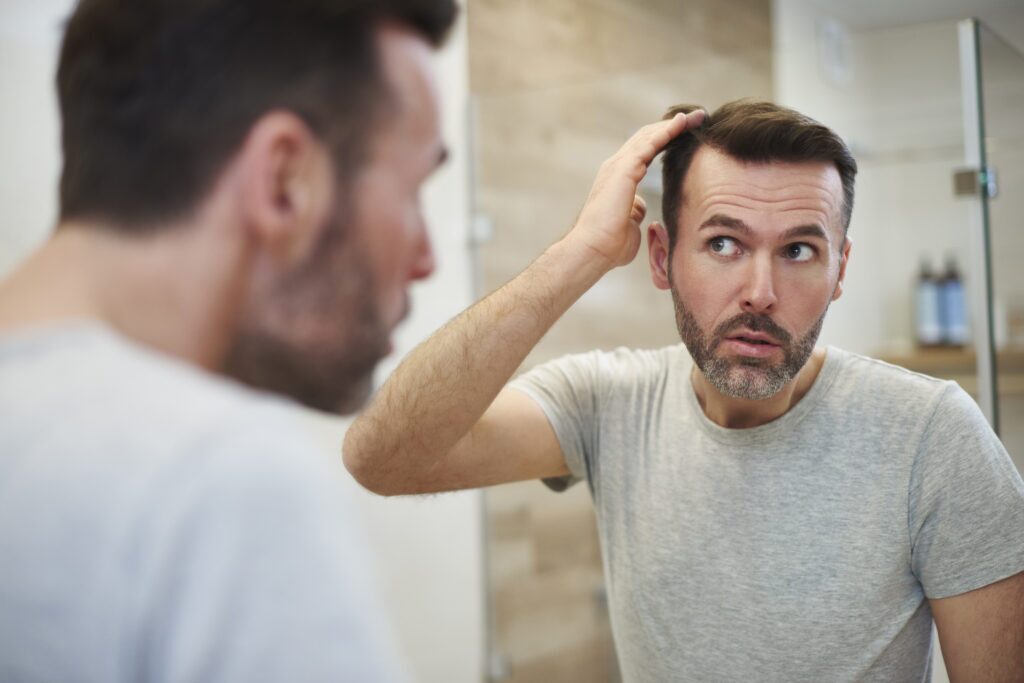Medical Review by Jennie Stanford, MD, FAAFP, DipABOM
Summary:
- Hair loss myths can cause anxiety and misinformation. Understanding the real causes can help you avoid unnecessary worry and seek proper treatment.
- Stress, hormones, medications, and medical conditions can all cause hair loss.
- Wearing hats or shampooing too often does not cause hair loss directly, although certain styling practices can put stress on your hair.
- Hair loss can affect both men and women, although men are more likely to be affected.
- Hair loss can be managed with FDA-approved medications or hair transplant procedures.
- Talking to your healthcare practitioner can give you the proper guidance to support you with hair loss and take proper care of your scalp.
Hair loss doesn’t have to be scary
Myths about hair loss can lead to unnecessary anxiety and misinformation if you are experiencing hair thinning or baldness. However, many common misconceptions surrounding hair loss can be easily debunked, empowering you to make more informed and confident choices about how you approach this common condition.
Below, we explore several of the most common myths about why hair loss happens, who it affects, and how it can be managed. Use this information to make a better treatment plan with your healthcare provider.
Myth: wearing hats causes hair loss
Contrary to popular belief, wearing wigs or hats doesn’t normally cause hair loss on its own. Wigs and hats can be worn safely and may even protect against environmental factors contributing to hair damage. A hat would have to be incredibly tight to cut off blood flow to your hair follicles to the point where it temporarily affected your hair growth.
However, tight hairstyles that excessively pull the hair can cause a form of hair loss called traction alopecia. Anything that pulls your hair for long periods of time can create this risk, and chemically-treated hair is particularly vulnerable.
Myth: shampooing too often causes hair loss
If you’re worried that washing your hair too much will make you go bald, don’t be. Shampooing your hair is not one of the causes of hair loss.
In fact, keeping your scalp clean by washing your hair with appropriate products can actually improve the condition of your hair and make it less likely to experience breakage or thinning due to a condition called oxidative stress. Just make sure not to use harsh chemicals on your hair often, as this can make it more fragile over time (see above).
Myth: only men experience hair loss
Hair loss is a condition that affects both men and women. Male-pattern hair loss may be more commonly known, but female-pattern hair loss is a common condition that also involves gradual hair thinning, particularly on the crown and top of the scalp. It’s important to understand that hair loss can be a challenging experience for many individuals, and everyone has their own journey.
Myth: hair loss is always genetic
While genetics are a significant factor in hair loss, they are not the only cause. Many other factors can contribute to hair thinning and baldness, and hair loss patterns may vary among individuals depending on their unique genetic makeup.
Myth: baldness comes from the mother’s side
The idea that you inherit hair loss from your mother’s side of the family is a folk tale—in reality, genes from both parents play a role in whether or not you lose your hair.
Myth: hair loss is always irreversible
While some types of hair loss cannot be reversed, many can be effectively treated. The most common treatments for hair loss are FDA-approved medications like finasteride and minoxidil. These drugs help lower the levels of a hormone in your body called dihydrotestosterone (DHT), which can make your hair follicles shrink. Other approaches to treating hair loss include low-level light therapy and hair transplantation.
Learn more: How Is Hair Loss Treated?
Myth: cutting hair makes it grow thicker
Although it may be a popular rumor, cutting hair from the ends does not promote thicker growth since hair grows from the root. Although regular trims can help keep hair looking healthy by preventing split ends, they do not impact the thickness or density of hair growth.
Myth: stress is the sole cause of hair loss
Stress can contribute to hair loss, but it is not the only cause. Temporary hair loss due to stress is just one type of hair loss, which is called telogen effluvium. It can be managed by controlling stress levels and adopting healthy coping mechanisms.
Myth: dietary supplements alone can cure hair loss
A lack of nutrients can have negative effects on the structure and growth of your hair, but there is not enough evidence to suggest that taking dietary supplements alone will make your hair grow back. Unregulated supplements are often advertised with claims that they can treat hair loss, but these are not FDA-approved or independently verified.
Myth: natural remedies guarantee hair regrowth
Some natural products like saw palmetto may help with managing hair loss, and improving blood flow to the scalp via massage may also help stimulate your hair follicles. However, further research is needed to confirm either of these possibilities, so it’s important to keep your expectations realistic before trying either of these methods.
Learn more: What are natural treatments for hair loss?
Find support for hair loss with Lemonaid Health
Losing your hair can be confusing and upsetting, but having accurate information helps you make better choices about how to move forward. Talking to a qualified healthcare professional about the hair loss you’re experiencing can allow them to build a treatment plan with you that is as safe and effective as possible. Explore Lemonaid Health’s hair loss treatments to learn more about how we can support you.
FAQ
Are there any proven methods to prevent hair loss?
Because your genetics play a role in whether or not you lose your hair, there is no universal method to prevent it from happening. However, hair loss can often be treated and managed with medication, low-level light therapy, or hair transplantation surgery.
Are there any natural remedies that can effectively treat hair loss?
Certain natural supplements, scalp massage, and other natural remedies may help support healthier hair, but there is not enough evidence to conclusively say that they can treat or reverse hair loss. Some unregulated supplements may also come with risks, so be sure to consult a healthcare provider before taking them.












